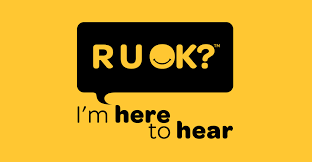R U OK? Day
September 14th, 2023
By encouraging Australians to reach out and start a conversation with their friends, family members and colleagues, R U OK? Day aims to prevent mental ill-health and promote ways to improve and foster good mental health to help us to all thrive.
Mental Health in the Workplace
This annual R U OK? Day brings awareness to the importance of supporting mental health and wellbeing in the workplace. While the workplace can be a place of fulfilment and a source of meaningful social connection, it can also be extremely stressful and challenging. Stressors in the workplace such as workload, role conflict and discrimination, can cause significant interpersonal distress and contribute to poor mental health. Difficulties both inside and outside the workplace can contribute to mental health problems especially if they are not addressed or managed appropriately.
RUOK? Calls for employers to foster a safe and supportive workplace culture where employees are encouraged to talk about their mental health and wellbeing and are provided access to help and support if they require it. An RUOK? Culture also promotes positive mental health and wellbeing through encouraging the setting of realistic and achievable goals, being fair and inclusive and encouraging personal self-care such as lunch breaks and leave.
Mental Health and Neurodiversity
While neurodivergent people go through the same stressors and strains of life as neurotypical individuals both inside and outside of the workplace, their experiences may be compounded by other factors such as stigma, social isolation and burnout from masking neurodivergent traits. These additional specific neurodivergent experiences place neurodivergent individuals at a greater risk of experiencing poor mental health and wellbeing.
In an inquiry into Mental Health and Suicide in Australia, La Trobe University (2021) reported that members of the neurodivergent community are at an exceptionally high risk of mental health problems and subsequent suicide. Further, neurodivergent people also have co-occurring mental health disorders, significantly exceeding rates seen in the neurotypical Australian population (Murray et al., 2018).
Neurodiversity and Help Seeking
Neurodivergent people may also face difficulties recognising their thoughts and feelings and communicating these to the neurotypical people around them, including health professionals. Subsequently, neurodivergent people face additional barriers to seeking help and support. This is reflected in the significantly lower rates of help-seeking among neurodivergent people, relative to neurotypical people as reported by La Trobe University (2021).
How can we support Neurodiversity in the Workplace and Community
There are several ways RUOK? Australia suggests we can support neurodiverse people within our local community and workplace to seek help or support for their mental health difficulties. These include:
Ø Utilising the neurodivergent persons preferred method of communication e.g., face-to-face catch up, text message, phone call.
Ø Giving the neurodivergent person your full attention and allowing them the space and time to process or respond.
Ø Asking direct questions, such as “have you been having suicidal thoughts?" rather than vague or ambiguous questions.
Ø Assisting a neurodivergent person to organise an appointment with their local GP or a neuro-affirming psychologist/counsellor.
Ø Organising opportunities for respectful and open communication with colleagues and management

